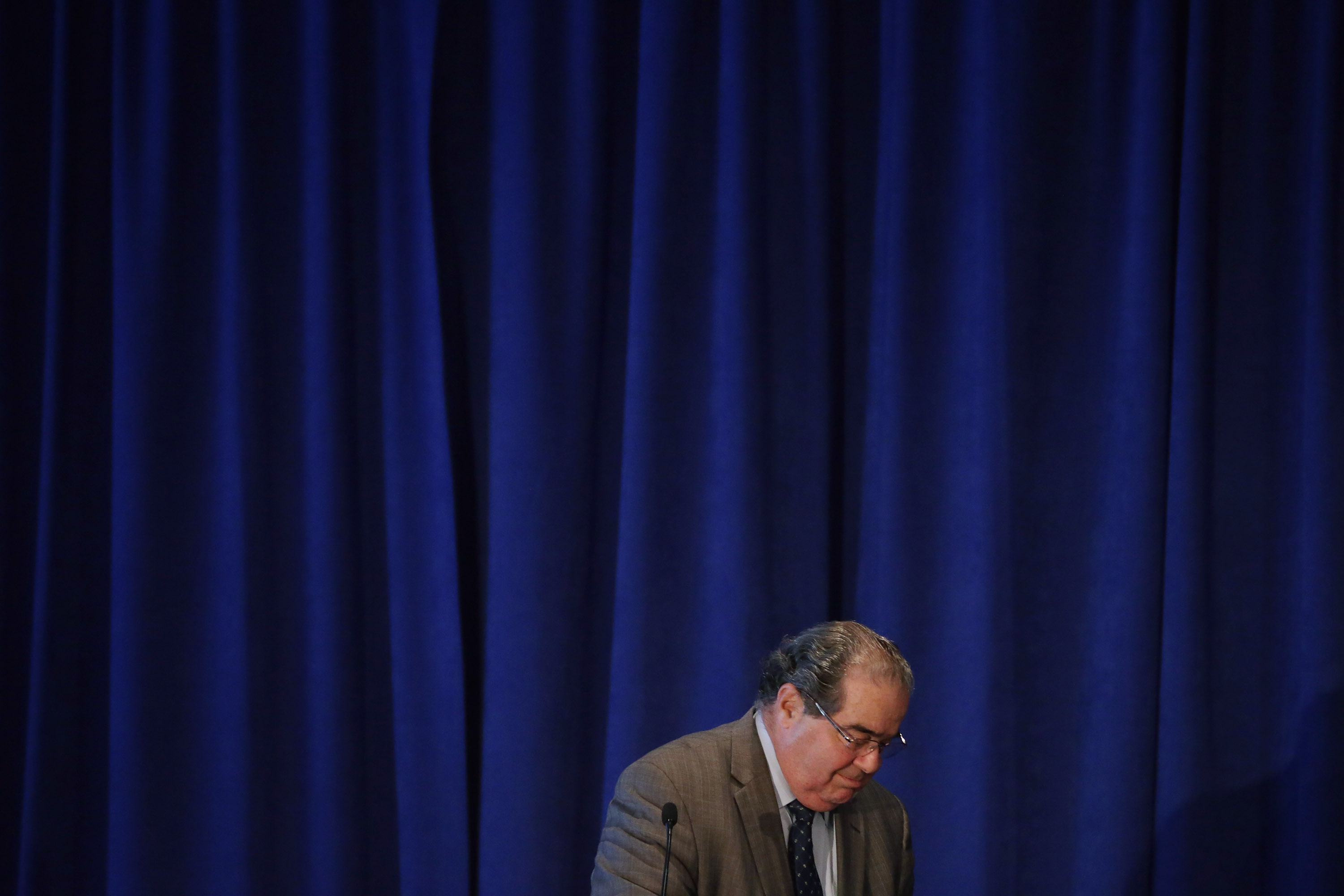The telling incoherence of Antonin Scalia's 'pederast' comments
The Supreme Court justice's latest broadside against gay marriage isn't just offensive. It's insane.


In a recent speech at Georgetown University Law School, Supreme Court Justice Antonin Scalia engaged in one of his favorite modes of argument: the offensive slippery slope.
If laws burdening gays and lesbians are subject to heightened scrutiny under the Constitution, Scalia asked, "What about pederasts? What about child abusers?" It's easy — and certainly not wrong! — to find the comparison offensive. But in the context of Scalia's jurisprudence, the even bigger problem is that his argument is incoherent and obviously being offered in bad faith.
Scalia's argument is that because the Due Process Clause of the Fifth Amendment (which binds the federal government) and the Due Process and Equal Protection Clauses of the 14th Amendment do not specifically mention gays and lesbians, the amendments cannot be interpreted as preventing the state from discriminating against LGBT people. "So should I on the Supreme Court say [pederasts and child abusers are] a deserving minority? Nobody loves them... No, if you believe in democracy, you should put it to the people." There is no principled basis by which judges can distinguish between the rights of gays and lesbians or women, say, and child molesters. What minority rights are worthy of minority protection must be determined by legislative majorities.
Subscribe to The Week
Escape your echo chamber. Get the facts behind the news, plus analysis from multiple perspectives.

Sign up for The Week's Free Newsletters
From our morning news briefing to a weekly Good News Newsletter, get the best of The Week delivered directly to your inbox.
From our morning news briefing to a weekly Good News Newsletter, get the best of The Week delivered directly to your inbox.
Scalia's argument is a familiar one. His former colleague, the late Chief Justice William Rehnquist, made a similar argument as a Supreme Court clerk in 1952:
To the argument made by Thurgood Marshall that a majority may not deprive a minority of its constitutional right, the answer must be made that while this is sound in theory, in the long run it is the majority who will determine what the constitutional rights of the minority are…realize that it is an unpopular and unhumanitarian position, for which I have been excoriated by "liberal" colleagues, but I think Plessy v. Ferguson was right and should be re-affirmed. [Rehnquist]
If your theory leads you to the conclusion that Brown v. Board of Education was incorrectly decided, you need a new theory. Of course, Scalia has said elsewhere that he would have voted with the majority in Brown. But this just makes his theory less coherent than Rehnquist's. "Judges cannot determine which minority groups are entitled to heightened protections under the equal protection clause except when they can" loses quite a bit of force as a critique of the Supreme Court's holding that same-sex marriage is a fundamental right.
How can Scalia justify making an exception for Brown? It certainly cannot be derived from the text of the 14th Amendment, which does not mention race. Instead, Scalia has to argue that the equal protection clause was originally understood as applying to discrimination against African-Americans, and only this form of discrimination.
This argument, however, quickly collapses. Cases in which Scalia has interpreted the 14th Amendment as forbidding racial discrimination have generally not concerned the rights of African-Americans. Rather, these decisions have done things like shut down integration measures pursued by local school districts or protected the alleged rights of mediocre white college applicants to attend their first choice of school.
These applications pretty much destroy Scalia's allegedly "originalist" reading of the 14th Amendment. There is no evidence that the 14th Amendment was originally understood as forbidding affirmative action programs, and Scalia has never even tried to make such a case. Scalia can try to escape from this by saying that the 14th Amendment forbids a broader, more abstract principle of racial discrimination than it was originally understood as doing. But once you've started down that road, there's no principled reason to deny that the amendment forbids invidious discrimination against groups Scalia does not think are protected by the 14th Amendment, like women and gays and lesbians.
And, of course, it's worse than that for Scalia. For all his bluster implying that he's America's Last Honest Judge, we shouldn't forget that Scalia joined and has aggressively defended Bush v. Gore, the nakedly partisan resolution of the 2000 presidential election that, as it happens, was decided based on the Equal Protection Clause. Scalia would have us believe that it's absurd to think that discrimination against gays and lesbians is forbidden by the 14th Amendment. But, apparently, it's perfectly reasonable to think that the 14th Amendment forbids counting votes without a uniform state-wide standard if the count threatens to result in George W. Bush losing an election… and not in any other case (including the non-uniform count that awarded Florida's electoral college votes to Bush.) Scalia has never offered an "originalist" defense of Bush v. Gore, and I'm pretty confident we're never going to get one.
When the Supreme Court decided that bans on same-sex marriage violated the Constitution, they were doing what all judges, including Justice Scalia, do — exercise reasonable judgment when interpreting the abstract rights guaranteed by the Constitution. One can disagree with the Court's judgment, but the idea that the decision represents some kind of illegitimate usurpation of legislative prerogatives is silly. And the idea that minority rights should be left solely to the mercies of legislative majorities, whether right or wrong, is not the theory that animates the Constitution of the United States.
A free daily email with the biggest news stories of the day – and the best features from TheWeek.com
Scott Lemieux is a professor of political science at the College of Saint Rose in Albany, N.Y., with a focus on the Supreme Court and constitutional law. He is a frequent contributor to the American Prospect and blogs for Lawyers, Guns and Money.



